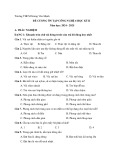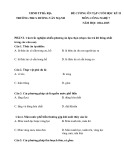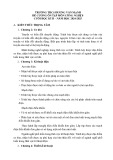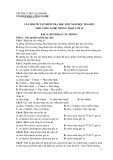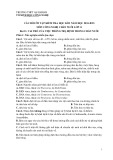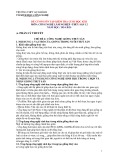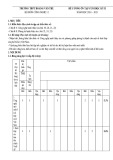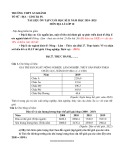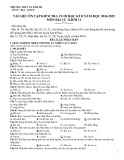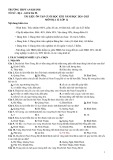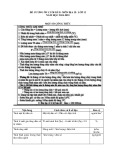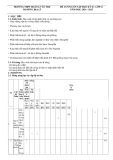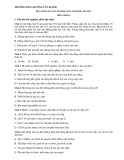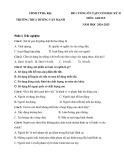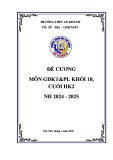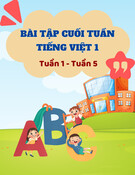
UBND THÀNH PHỐ VŨNG TÀU
TRƯỜNG THCS LƯƠNG THẾ VINH
ĐỀ CƯƠNG ÔN TẬP CUỐI HỌC KỲ II
NĂM HỌC 2023 - 2024
MÔN TIẾNG ANH 7
A. VOCABULARY: Unit 10, 11, 12
B. GRAMMAR:
I. Verb tenses:
1. The present progressive tense. (Thì hiện tại tiếp diễn).
(+) S + am/ is/ are+ V-ing ….
Ex: She is reading a book now.
Adverbs.Now, at present, at the moment, at this time,
look !, listen!, hurry up!….
Notes: playplaying; writewriting; getgetting
2. The future simple tense. (Thì tương lai đơn)
(+) S + will + V (inf)……..
(-) S+ won’t +V(inf)+……..
(?) Will + S+ V(inf) +…….. ?
-Yes, S+ will.
- No, S+ won’t.
Adverbs: tonight, this evening, tomorrow, next (week/
year/…), in the future, one day, soon, in 2030, later, …
II. POSSESSIVE PRONOUNS (Đại từ sở hữu)
1. Các đại từ sở hữu
Personal pronouns
Đại từ nhân xưng
Possessive
adjectives
Tính từ sở hữu
Meaning
Possessive
pronouns
Đại từ sở hữu
Meaning
I
my
của tôi
mine
Cáicủa tôi
you
your
của bạn
yours
Cái của bạn
we
our
của chúng tôi
ours
Cái của chúng tôi
they
their
của họ
theirs
Cái của họ
he
his
của anh ấy
his
Cái của anh ấy
she
her
của cô ấy
hers
Cái của cô ấy
it
its
của nó
its
Cái của nó
2. Cách sử dụng đại từ sở hữu trong tiếng Anh
Các trường hợp
dùng Đại từ sở hữu
- Dùng thay cho một tính từ sở hữu và một danh từ đã nói phía trước.
Ex: This is my book and that is yours, (yours =your book)
-Dùng trong dạng câu sở hữu kép. Ex: Ms. Hang is a friend of mine.
-Dùng ở cuối các lá thư như một quy ước. Trường hợp này, người ta chỉ
dùng ngôi thứ hai. Ex: Yours sincerely: Trân trọng
III. ARTICLE (Mạo từ)
1. Cách sử dụng mạo từ bât đinh “a/an”
- Chúng ta dùng a/an (một cái, một con, một vât...) trước danh từ đêm được ở số ít.
Dùng mạo từ “a”
Dùng mạo từ “an”









